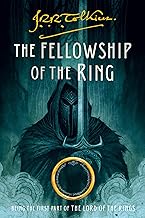
Review: The Fellowship of the Ring – Book 1, Chapter 4: A Short Cut to Mushrooms
Introduction
“A Short Cut to Mushrooms,” the fourth chapter of The Fellowship of the Ring, continues the slow but steady evolution of the narrative from peaceful beginnings toward the darker, perilous journey ahead. Following the growing tension from “Three Is Company,” this chapter provides a subtle yet powerful blend of pastoral imagery, suspense, and character development. While on the surface it appears to be a quieter interlude, it deepens the tone of the story and serves as an essential stepping stone in Frodo’s transformation from a Shire-dwelling hobbit to the Ring-bearer burdened with a world-altering quest.
Narrative Structure and Pacing
The chapter picks up immediately after Frodo, Sam, and Pippin spend the night in the company of the Elves. The serene safety of that night quickly gives way to a creeping sense of danger as the hobbits resume their journey. Tolkien expertly modulates the pacing here—interweaving lighthearted moments, nostalgic detours, and looming dread.
The structure of the chapter can be broken down as follows:
Resuming the Journey – The hobbits rise and continue toward Crickhollow, but they are haunted by the memory of the Black Riders. The journey now feels more vulnerable, less protected.
The Shortcut and its Consequences – Frodo insists on taking a shortcut across the fields, partly to avoid detection, but also reflecting his desire to act decisively in unfamiliar circumstances. The path leads them through woods and farmland—reminding readers of the richness and innocence of the Shire while foreshadowing the world beyond.
Another Black Rider Encounter – The fear escalates when they narrowly avoid a Black Rider. The Ring’s allure and danger become more palpable, and Frodo’s temptation to use it hints at its corrupting power.
Farmer Maggot’s Unexpected Help – The chapter culminates in a visit to Farmer Maggot’s house, a moment of both comedy and unexpected hospitality. Frodo, who once feared the stern farmer, finds a trustworthy ally who offers them protection and a much-needed ride to Bucklebury Ferry.
Character Development
Frodo Baggins
Frodo continues to evolve in this chapter, moving further away from the protected life he once knew. His decision to take a shortcut signals a growing willingness to take initiative. He also wrestles with internal conflict when the Ring tempts him during another encounter with a Black Rider, highlighting his increasing burden. His surprise at Farmer Maggot’s kindness also shows how limited his earlier worldview was, confined by youthful fears and prejudices.
Sam Gamgee
Sam remains a steadfast companion, though his role here is more observational. He is deeply alert to danger and maintains a grounding presence. His rural knowledge and admiration for the Elves add emotional texture to the journey.
Pippin Took
Pippin, still lighthearted and a bit reckless, adds humor but also shows signs of growth. His comfort around Farmer Maggot and familiarity with the countryside contrast with Frodo’s nervousness, offering insight into the social and geographical nuances of Shire society.
Farmer Maggot
Maggot emerges as a surprisingly important character. While not a major figure in the plot, he represents the goodness and earthy wisdom of ordinary folk. His courage and practical support remind us that valor isn’t limited to warriors. He understands the seriousness of the Black Riders and steps up to help without hesitation.
Themes and Symbolism
The Loss of Innocence
Frodo’s fear of Farmer Maggot—stemming from his youthful mischief—symbolizes his lingering innocence. But his realization that Maggot is a friend, not a threat, parallels his emotional journey from childlike fears to adult responsibilities.
Home and Hospitality
Farmer Maggot’s warm hospitality and hearty food reflect Tolkien’s love of the Shire and its values: generosity, simplicity, and community. These moments serve as a counterbalance to the encroaching darkness, reinforcing the idea that even in times of peril, kindness survives.
The Encroaching Shadow
The presence of the Black Riders remains an ever-present threat. Their unnatural tracking and silence evoke a growing atmosphere of fear. Frodo’s near temptation to wear the Ring again underscores the persistent danger not only from external enemies but also from the internal struggle with power and corruption.
Worldbuilding
Tolkien’s depiction of the Shire continues to deepen in this chapter. From the woods and mushrooms to the rustic charm of Maggot’s farm, these small details ground the fantasy in a world that feels lived-in and emotionally resonant. The use of distinct regional behaviors (Frodo’s fear vs. Pippin’s comfort) adds complexity to hobbit society and shows that even within a peaceful land, there are varying experiences and perspectives.
Foreshadowing
The Black Riders’ persistence and their connection to the Ring become clearer, intensifying the need for secrecy and urgency.
Frodo’s temptation to wear the Ring under stress lays the groundwork for future moments of crisis.
Farmer Maggot’s remark that the Riders are “not natural” hints at their dark origin as Ringwraiths—servants of Sauron.
Conclusion
A Short Cut to Mushrooms is a deceptively simple chapter, rich in texture and quiet revelations. Though less dramatic than others, it plays a vital role in charting Frodo’s development and deepening the reader’s understanding of the Shire, friendship, and the creeping threat of the outside world. By blending rustic charm with growing danger, Tolkien builds both emotional resonance and narrative momentum. The chapter reminds us that even the smallest characters and seemingly minor choices can shape the path of a great journey.
As Frodo, Sam, and Pippin cross the Brandywine River and head into Buckland, the innocence of their world begins to fade—and the real adventure begins.
- Hits: 49
Movies
Action
Adventure
Animation
Comedy
Crime
Documentary
Drama
Family
Sci-Fi & Fantasy
TV Shows
Action
Animation
Comedy
Crime
Documentary
Drama
Family
Sci-Fi & Fantasy
History
Alabama
Travels
Alabama

































































































